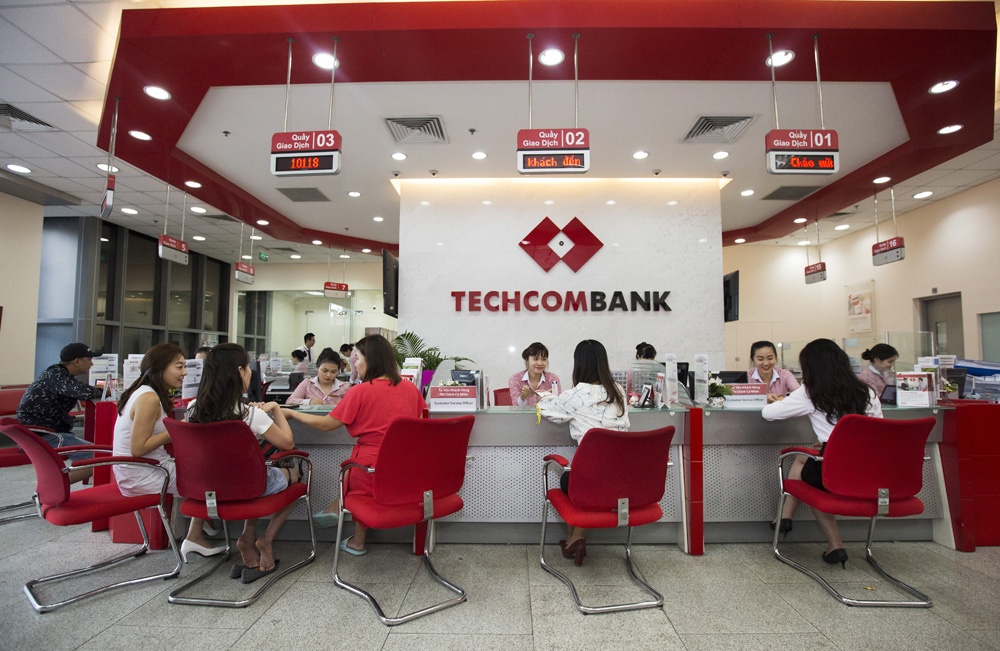For over two years Techcombank kept its deposit interest rates at low levels, even lower than the rates offered by State-owned lenders like Vietcombank, Vietinbank and Agribank.

For over two years Techcombank kept its deposit interest rates at low levels, even lower than the rates offered by State-owned lenders like Vietcombank, Vietinbank and Agribank.
But in late May, it decided to make significant hikes of 0.1-0.85 percentage points to them.
Similarly, VIB has increased its savings interest rates by 0.5-0.8 percentage points. For 6-11 month terms, the rate is up by 0.4 percentage points. For 13-month terms, it has increased by 0.3 percentage points.
Market observers said large banks, which previously always kept deposit interest rates at very low levels, have recently adjusted up their rates to improve their competitiveness in attracting deposits.
They include SHB, OCB, Ban Viet, Sacombank, SCB, and Kien Long, all of which have sharply hiked rates.
Banking industry insiders said the rate hikes of another 0.3-0.5 percentage points are likely in the rest of the year.
Tran Duc Anh, director of the KBSV Securities Company’s macro-economics and market strategy division, said large banks would increase interest rates for long-term deposits by around 0.5 percentage points.
Analysts from Saigon Securities Incorporation (SSI) said deposit interest rates are under increasing pressure in the wake of stronger-than-expected credit growth and rising inflation.
Banking expert Nguyen Tri Hieu concurred with analysts, saying savings interest rates are unlikely to remain at these historic low levels during the remaining months of this year as they were last year due to higher demand and inflationary pressure as well as fiercer competition for idle capital from other investment channels such as real estate and securities.
Data from the State Bank of Viet Nam shows that total credit supply as of June 30 topped VND11.4 quadrillion, up 9.35 per cent from the end of 2021 and 6.47 per cent over the same period last year.
Because of such strong credit growth, many banks have already almost exhausted the credit quotas they were given by the SBV for the full year.
SSI also said credit growth rates were at unprecedented levels at State-owned banks (up 6.4 per cent for the year), a positive sign for economic recovery.
Besides the high credit growth rate, analysts also believe the increasing inflationary pressure is another important reason for the deposit interest rate hikes.
They saido' some important indicators like the producer price index (PPI) and raw materials price index (RMPI) are going up by the day.
Analysts also raised concerns about imported inflation risks because Viet Nam's economy is very open to the world.
They said whenever world prices go up Vietnamese businesses pay a high price right away because domestic production still relies heavily on imported raw materials and equipment.
Meanwhile, the global situation is complicated with high inflation as many countries pumped money to stimulate their economy after COVID-19, due to supply chain disruptions and the Ukraine-Russia conflict.
All these have pushed into dangerous territory global commodity prices, with the price rise first seen in fuel now spreading to many other essential items such as wheat, rice and fertilisers.
On average, CPI in Viet Nam stood at 2.44 per cent in the first six months year-on-year and core inflation rose by 1.25 per cent, which were still relatively low compared to other countries.
Many experts including Tran Toan Thang, head of the National Centre for Socio-Economic Information and Forecast, however warned that from the middle of the year to the third quarter would be the most stressful period for inflation caused by the global trend of rising input costs.
Economist Can Van Luc believed that this year's inflation rate would be double that of last year or more and above the maximum target of 4 per cent set by the National Assembly.
Other analysts too said controlling inflation would not be easy this year as it is already quite high.
They said it is this that has forced banks to increase deposit interest rates to keep depositors.
As a result, deposits have risen sharply this year after declining last year as many depositors withdrew their money and invested in more attractive asset classes.
According to the latest data from the SBV, retail customers’ deposits increased by 3.28 per cent in the first three months of 2022 to nearly VND5.47 quadrillion.
Corporate customers’ deposits were worth over VND5.86 quadrillion, up 3.9 per cent.
Many analysts expect the SBV to raise its benchmark interest rates and tighten monetary policies as the central banks of many other countries are doing to contain inflation.
Corollary
Generally speaking, inflationary pressures and production costs are increasing sharply and having a huge impact on the economy including the banking sector.
But while deposit interest rates increase as banks compete for liquidity, experts point out lending interest rates cannot keep pace since the Government wants banks to keep lending interest rates steady to support the economy.
Besides, most loan agreements cannot be adjusted immediately and depends on their contract terms.
But many businesses in non-priority industries have started worrying the possibility of banks hiking their loan rates as deposit rates rise relentlessly.
Tran Thanh Nam, CEO of a company in HCM City’s Tan Binh District, said his company makes packaging, which is not in the Government’s list of priority industries. So it has to pay a loan interest rate of 7.5 per cent.
“The rate might be acceptable if the economy is stable and essential goods are priced reasonably. But since the prices of all kinds of goods and services needed for production are already up strongly, interest rate hikes would cause heavy pressure on producers like us,” Nam said. — VNS





